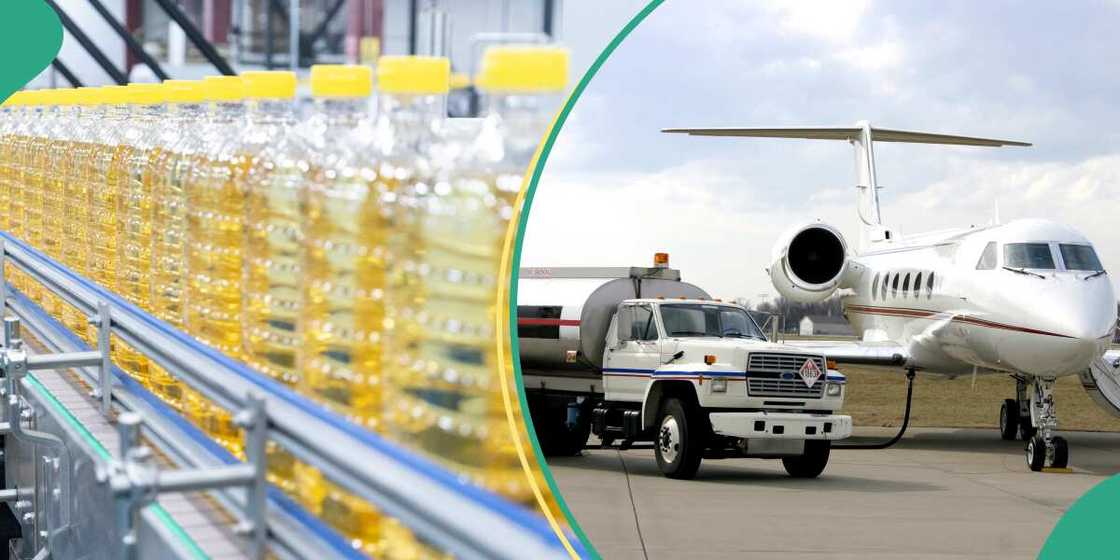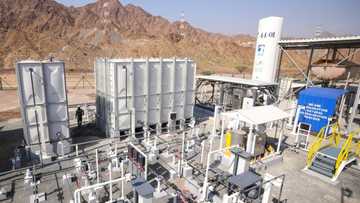Hope For Air Peace, Others as Popular Airline Flies Transatlantic With Cooking-Oil Powered Engines
- Virgin Atlantic airline has operated a transatlantic flight from London to the US using a cooking oil-powered engine
- The airline operated the test flight as the aviation industry seeks to move away from JetA1 or aviation fuel
- Airline operators in Nigeria have asked the Nigerian government to explore alternative sources of aviation fuel due to the high cost of the product
Pascal Oparada has over a decade of experience covering Tech, Energy, Stocks, Investments, and Economy.
This week, prominent airline Virgin Atlantic recorded a significant milestone, operating the first transatlantic jetliner powered by Sustainable Aviation Fuel (SAF) made from cooking oil.
The airline operated the flight from London's Heathrow to New York's JFK Airport with a Boeing 787 Dreamliner.

Source: Getty Images
The British government praises airline
Billionaire founder of Virgin Atlantic, Richard Branson, Transport Secretary Mark Harper, and Virgin Chief Executive Shai Weiss were among the passengers on the flight. The flight flew them for free.
PAY ATTENTION: Click “See First” under the “Following” tab to see Legit.ng News on your Facebook News Feed!
He said the airline had been challenging the status quo and pushing the aviation industry since 1984.
The Transport Secretary said that the 100% SAF-powered flight reflects how the world could decarbonize transport now and in the future, reducing lifecycle emissions by 70% and inspiring the next generation.
Before the flight, the British Civil Aviation Authority analyzed various aspects of the airline's planned flight before granting the operating permit, including undertaking ground testing with an engine running 100% on SAF.
The authority's Chief Executive, Rob Bishton, said it is vital to accept more sustainable practices and push the frontiers of what's possible to create a greener aviation industry.
SAF is produced from agricultural waste
SAF is perceived as critical to reducing the aviation industry's carbon emissions but is more expensive to produce than jet fuel.

Read also
No more foreign pilots: FG gives fresh order to Air Peace, United Airlines, Arik Air, others
It is made from sustainable sources such as agricultural waste and cooking oil. It means its production uses about 70% less carbon.
SAF can be used in jet engines to a maximum blend of 50% with kerosene without needing modifications.
The Guardian reports that American company Gulfstream Aerospace operated the first transatlantic flight powered by 100 percent SAF earlier this month using a business jet.
Airlines in Nigeria call for a similar shift
In Nigeria, Airline operators have said the country is mature enough to find alternatives for aviation fuel, also known as JetAI, considering the high cost of imports.
A report by Legit.ng stated that the operators called on the Nigerian government Wednesday, October 18, 2023, in Abuja at a meeting on developing and using Sustainable Aviation Fuel (SAF), Low Carbon Available Fuel, and other transparent fuel sources in Nigeria.
Aviation fuel is kerosene in its most purified form.
Iyayi revealed that operators in the industry are keenly following trends, especially talks around sustainable aviation fuel and its vast opportunity for Nigeria, as the main component of sustainable aviation fuel is palm oil.
Hope For Air Peace, Max Air, others as firms successfully convert used cooking oil to aviation fuel
Legit.ng reported that TotalEnergies and Saudi Arabia's Aramco joint venture have successfully converted cooking oil to a sustainable JetA1, also known as aviation fuel.
According to reports, the SARTOP JV has received international Sustainability and Carbon Certification to produce aviation fuel after meeting all product quality conditions.
The fuel produced via cooking oil reportedly reduced carbon dioxide emissions by 80% on average through the entire lifecycle, compared with fossil fuel.
PAY ATTENTION: Unlock the best of Legit.ng on Pinterest! Subscribe now and get your daily inspiration!
Source: Legit.ng




